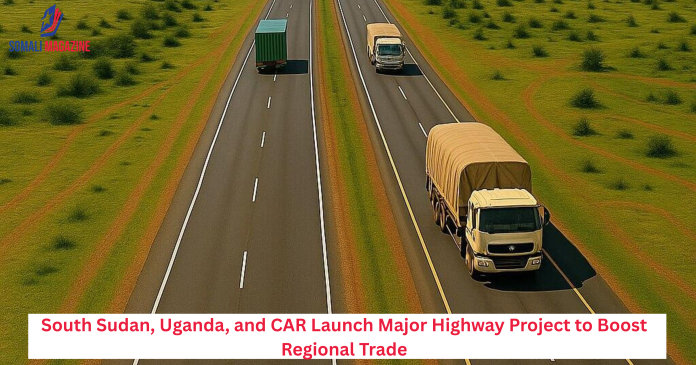Facebook Twitter (X) Instagram Somali Magazine - People's Magazine
The 1,800km road network aims to improve cross-border connectivity, create jobs, and drive economic growth across East and Central Africa
South Sudan, Uganda, and the Central African Republic (CAR) have joined forces on a major infrastructure project that aims to boost trade, improve connectivity, and support economic growth across the region. The three countries will work together to raise funds and build an 1,800-kilometre highway network to improve transport between their nations.
The project is expected to transform the regional trade corridor, making it easier and faster to move goods and people between East and Central Africa.
South Sudan’s Minister of Roads and Bridges, Simon Mijok Mijak, shared details of the project and highlighted the planned routes. The first major route will run from Kampala, Uganda’s capital, to South Sudan’s capital, Juba. It will either pass through Karuma, Arua, Oraba, Kaya, Yei, and Juba or follow the Karuma-Nimule-Juba route.
The second key route will extend from Juba to Bangui, the capital of the Central African Republic. This route will go through towns such as Mundri, Maridi, Yambio, Yubo, Ezo, Bambouti, Obo, and Sibuti. There is also an extra segment that will connect Ezo, Source Yubu, and Bambouti, further linking South Sudan and CAR.
“This project is a game-changer for regional integration,” said Minister Mijak. “The Central African Republic wants to connect to Uganda through South Sudan. We’ve proposed two main routes to make this happen: one going through Nimule, Juba, Mundri, Maridi, Yambio, and Tambura, and the other through Kaya, Morobo, Yei, Lainya, and Juba. These roads will be key for trade and cooperation.”
The highway project will also create thousands of jobs, especially for young people. The countries plan to use labour-intensive construction methods so that more local workers can be hired. In addition, the project is expected to boost other sectors such as transport, construction, and natural resource industries, including fishing.
“We want this project to help communities by creating jobs and supporting sustainable development,” Mijak explained. “It’s not just about roads—it’s about helping local economies grow through work in construction, transport, and other support services.”
Once completed, the new road network will improve access to markets, allowing easier movement of agricultural products, manufactured goods, and raw materials. It will also help lower the cost and time of transport across the region.
The highway initiative is part of a larger vision to promote economic cooperation in Africa. It supports regional goals under the East African Community (EAC) and the African Union’s Agenda 2063, both of which focus on building strong infrastructure to drive economic development.
To fund the project, the three countries will work together to attract money from different sources. This includes national government budgets, international donors, and private investors.
“This is not just a road project—it’s a foundation for stronger regional ties and long-term economic success,” Mijak said.
The ambitious project reflects the growing cooperation between East and Central African countries. By working together, Uganda, South Sudan, and CAR hope to open up new trade routes, support local industries, and improve the lives of millions of people across the region.

